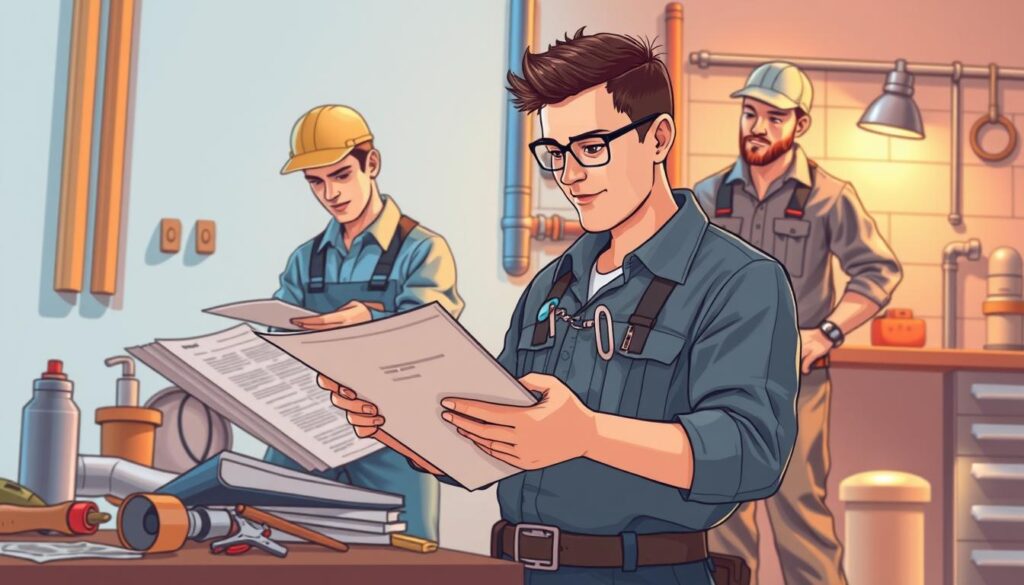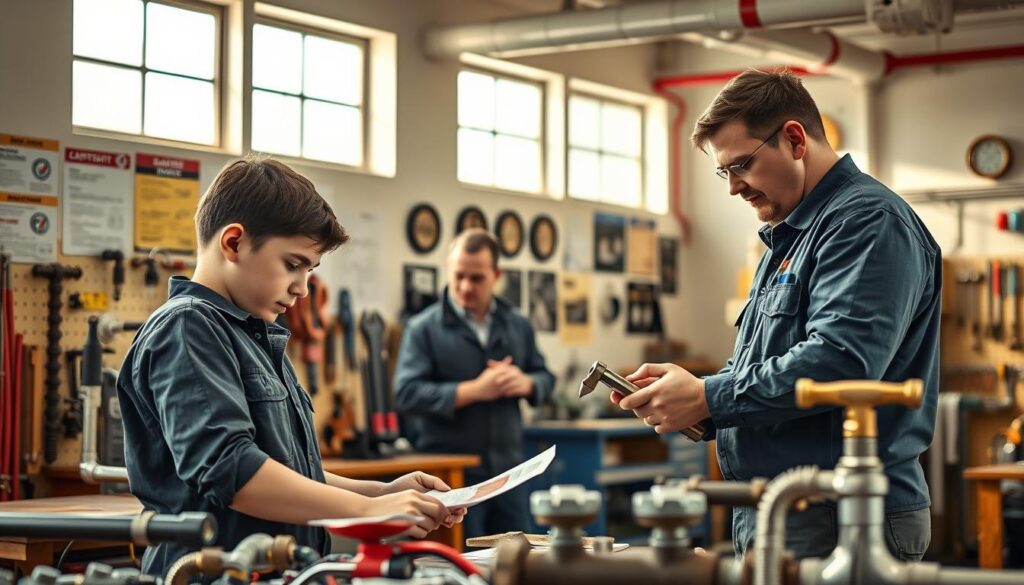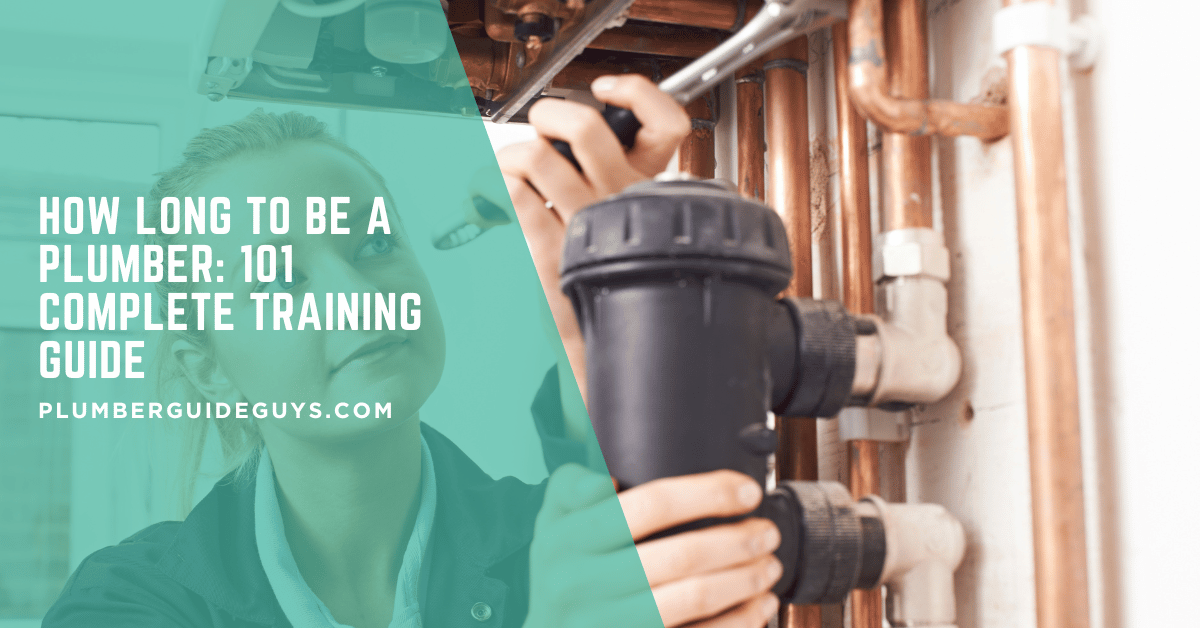Affiliate Disclosure
Plumber Guide Guys is a participant in the Amazon Services LLC Associates Program, an affiliate advertising program designed to provide a means for sites to earn advertising fees by advertising and linking to Amazon.
How Long to Be a Plumber? Did you know that 90% of plumbers are very happy with their jobs? Plumbing is a rewarding career with lots of chances for those who are willing to learn. It’s a field that offers a lot of opportunities.

To become a professional plumber, you need to plan carefully and work hard. Your path to becoming a plumber includes education, hands-on training, and getting certified. Knowing how long it takes to become a plumber helps you plan your career.
The Bureau of Labor Statistics says plumbing jobs will grow by 4% from 2022 to 2032. This means there will be plenty of jobs and good pay for skilled plumbers. It’s a secure and rewarding career for those who are dedicated to their work.
Key Takeaways
- Plumbing offers stable career opportunities with high job satisfaction
- Comprehensive training typically takes 4-5 years
- Multiple pathways exist for entering the plumbing profession
- Ongoing education is key for career growth
- Potential for entrepreneurship exists in this skilled trade
Table of Contents
Understanding the Path to Becoming a Professional Plumber
Starting a career in plumbing is exciting for those looking for a stable job. It involves education, training, and skill building. These steps turn your passion into a real career.
Basic Requirements and Prerequisites
To begin your plumbing journey, you need to meet some basic requirements:
- High school diploma or equivalent
- Minimum age of 18 years
- Physical fitness for demanding work
- Basic math and problem-solving skills
Career Progression Roadmap
Here’s how you become a licensed plumber:
- Apprentice Plumber: Initial training phase
- Journeyman Plumber: Advanced skill development
- Master Plumber: Professional expertise and business ownership
Essential Skills and Aptitudes
“Success in plumbing is about more than technical skills—it’s about problem-solving, communication, and customer service.” – Professional Plumbing Association
Good plumbers have technical and people skills. Key skills include:
- Strong mechanical aptitude
- Excellent spatial reasoning
- Physical stamina and dexterity
- Customer communication skills
- Attention to detail
Getting to be a licensed plumber takes hard work, learning, and growth. Each step adds to your skills, making you a respected professional.
How Long to Be a Plumber: Breaking Down the Timeline
Becoming a professional plumber is a journey that needs dedication and planning. It involves several stages, each with its own time frame. These stages shape how long it takes to become a plumber.
The path from apprentice to master plumber takes several years. It includes focused training and practical experience. Here’s a look at the main stages:
- Trade School Training: 6-24 months
- Apprenticeship Program: 4-5 years
- Journeyman Certification: Additional 2-3 years
- Master Plumber Qualification: Approximately 8-10 years total
Your journey begins with technical training at trade school. These programs last from 6 months to 2 years. You’ll learn about pipe systems, safety, and blueprint reading.
The apprenticeship phase is key. It lets you apply what you’ve learned in real situations. You work with experienced plumbers, gaining skills and earning money.
Professional plumbers say patience and consistent learning are essential. They help you succeed in your career.
Remember, timelines can vary. They depend on where you are, how much you commit, and your goals. But the overall path is similar everywhere in the U.S.
Initial Training and Education Requirements
Starting a career in plumbing means understanding your education options. The requirements for plumber training vary. But, picking the right educational path is key to your success in the plumbing trade.
Choosing your path in plumbing begins with educational programs. These programs shape your initial training and skills.
Trade School Programs Duration
Trade schools offer structured paths for plumbers. They provide in-depth training in plumbing skills and techniques.
- Certificate programs: 6-12 months of intensive training
- Technical diploma: 12-18 months of coursework
- Hands-on workshops and practical training included
Certificate vs. Associate Degree Options
Your education choice affects your plumbing career. It impacts your education length and career prospects.
| Program Type | Duration | Estimated Cost | Key Benefits |
|---|---|---|---|
| Certificate Program | 6-12 months | $1,200 – $4,000 | Quick entry into workforce |
| Associate Degree | 2 years | $3,000 – $10,000 | Broader technical knowledge |
Cost and Time Investment Comparison
Choosing the right education is a big decision. It involves time and money. Think about these when planning your plumber training:
- Evaluate your career goals
- Compare program curriculum
- Check accreditation status
- Research financial aid options
Pro tip: Many community colleges and trade schools offer flexible scheduling and financial assistance to help manage your education costs.
Investing in quality education is the first step toward a successful plumbing career.
The Apprenticeship Journey

Starting a plumber apprenticeship is a big step. It moves you from learning in a classroom to gaining real-world skills. This journey usually takes 4-5 years, turning you from a beginner to a skilled plumber.
Your path from apprentice to master plumber involves a lot of training. You’ll learn through both hands-on experience and classroom lessons. You’ll typically do:
- 8,000 hours of on-the-job training
- About 500 hours of classroom learning
- Steps to improve your skills
During your apprenticeship, you’ll work with experienced plumbers. Apprenticeship programs offer a place to learn important skills. You’ll learn how to install pipes, keep systems running, and solve complex problems.
As you move up in your apprenticeship, you’ll earn more money. Beginners make about 40-50% of what a journeyman plumber makes. But, as you get better, your pay will go up.
“The apprenticeship is your foundation for a successful plumbing career.” – Industry Professional
Important skills you’ll learn include:
- Reading blueprints
- Following safety rules
- Understanding plumbing codes
- Advanced problem-solving
Patience and dedication are your greatest assets during this journey.
Licensing and Certification Process
To become a licensed plumber, you must navigate a complex landscape. This varies by state. You’ll need to meet certain requirements, pass tough exams, and keep up with ongoing education.
The path to becoming a plumber involves several key stages. These stages require careful planning and dedication. Knowing these stages helps you plan your professional growth.
State-Specific Licensing Requirements
Each state has its own rules for getting a plumbing license. Your needs might include:
- Minimum age requirement (usually 18 years old)
- High school diploma or GED
- Documented work experience hours
- Successful completion of state-approved training program
Exam Preparation Timeline
Getting ready for your plumbing certification exam takes structured study and practice. Most states require exams that test both your knowledge and skills.
- Review state-specific exam content
- Enroll in preparatory courses
- Practice with sample tests
- Develop a solid study plan
Continuing Education Needs
Keeping your plumbing license means ongoing learning. Many places require you to take continuing education. This keeps you up-to-date with industry standards and new technologies.
Your dedication to learning shows you’re committed to your craft. It makes you stand out in the ever-changing plumbing world.
From Apprentice to Journeyman: Career Progression

Going from a plumbing apprentice to a journeyman plumber is a big step. These years are key for learning and building your name in the trade. You’ll turn basic skills into full-fledged professional abilities.
The path from apprentice to master plumber has several important steps:
- Completing 4-5 years of apprenticeship training
- Passing required licensing exams
- Showing off your practical skills
- Getting state-specific certifications
As a journeyman plumber, you’ll see your career grow a lot. You’ll handle bigger projects, work on your own, and even lead apprentice plumbers. Journeyman plumbers usually make 30-40% more than apprentices.
“Becoming a journeyman is about mastering your craft and proving your professional competence.” – Master Plumbers Association
Now, you can:
- Work alone on homes and businesses
- Look for better job chances
- Even start your own plumbing company
- Teach new apprentices
Planning your career wisely during your journeyman years will help you reach higher levels in plumbing.
Master Plumber Certification and Requirements
To reach the top in plumbing, you need hard work, skill, and a good plan. The master plumber career is the highest goal for plumbers.
Getting to be a master plumber takes many steps. These steps test your skills and dedication. The journey can take years, needing both experience and advanced knowledge.
Advanced Training Components
To become a master plumber, you must take extra training. This training is more than what journeyman plumbers get. It includes:
- Advanced technical courses in complex plumbing systems
- Business management and leadership training
- Advanced code compliance and regulatory knowledge
- Specialized technical workshops
Experience Requirements
Getting to be a master plumber takes a lot of experience. Most states ask for:
- 5-7 years as a licensed journeyman plumber
- Documented work experience in diverse plumbing environments
- Minimum of 8,000 hours of verified on-the-job training
Professional Development Milestones
Your career will hit important milestones. These show you’re getting better and taking on more. Continuous learning and skill refinement are key to moving up.
“Becoming a master plumber is not just about technical skills, but about leadership and understanding complex systems.” – Professional Plumbing Association
By investing in your education and gaining lots of experience, you’ll become a respected master plumber. You’ll be able to handle big projects and teach others.
Salary Progression and Career Opportunities
Starting as a plumber opens doors to financial growth and various career paths. The path to becoming a master plumber can greatly increase your earnings. As an apprentice, your income will grow with your skills and qualifications.
During your journeyman plumber years, you’ll hit important salary milestones. In cities like San Jose and San Francisco, skilled plumbers make about $80,000 a year. Your earnings depend on several things:
- Where you live
- Your special skills
- How long you’ve been working
- Any advanced certifications you have
Choosing a special area can really boost your pay. Look into areas like:
- Commercial plumbing systems
- Green technology installations
- Industrial pipeline maintenance
- Sustainable water management
“Your skills are your most valuable asset in the plumbing profession.” – Professional Trades Association
Starting your own plumbing business can also increase your earnings. With the right skills and connections, you could move from being an employee to a business owner. This could greatly raise your income.
Becoming a master plumber is more than just earning more. It’s about getting recognized, having job security, and helping train the next plumbers.
Building Your Professional Reputation
As you work towards becoming a licensed plumber, your reputation is key. It’s not just about knowing how to fix pipes. It’s about showing you’re reliable and skilled.
Good customer service is essential. When you’re getting your plumbing certification, aim to make every customer happy. This can lead to more job offers.
- Maintain clear communication with clients
- Provide transparent pricing
- Complete work on schedule
- Follow up after project completion
Today, the internet is a great place to build your image. Online reviews and ratings can really help your business. Plumbers with good online reviews get more jobs.
Networking is also important. Join groups, go to conferences, and meet other plumbers. They can offer advice and help you find new opportunities.
Your reputation is your most valuable professional tool in the plumbing industry.
Keep learning to show you’re serious about your work. Get more certifications, learn about new tech, and share your knowledge. This shows you’re committed to being the best.
Conclusion
Starting a career in plumbing is a rewarding choice. It takes about 4-7 years of training and experience. Your hard work in learning plumbing skills will pay off.
Every step in your plumbing career adds to your skills. You’ll learn a lot in trade school and through apprenticeships. You can even become a master plumber. This journey prepares you for a job that’s always in demand.
Your career path will depend on your goals and where you live. Some people finish their training quickly, while others take their time. But, plumbing offers steady work, good pay, and the chance to help your community.
To succeed in plumbing, keep learning and stay skilled. Understanding the training process and staying committed to your work will lead to a rewarding career. You’ll find joy and success in the plumbing industry.

